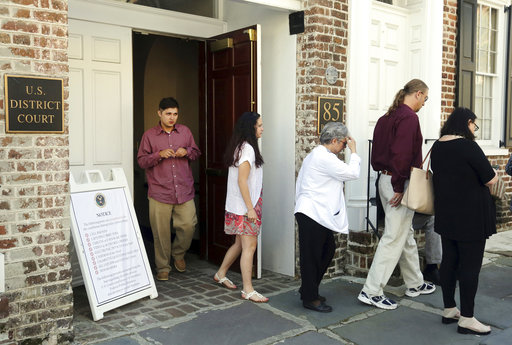CHARLESTON, S.C. (AP) — During a night of vodka, cocaine, marijuana and video games, Joey Meek listened as a childhood buddy confided that he hated blacks so much he was going to kill them at a South Carolina church.
Meek said he thought his friend was all talk until a week later, when news broke of a deadly shooting rampage at Emanuel AME Church in Charleston. But instead of calling authorities, Meek talked another friend out of going to police and giving them Dylann Roof’s name. And then he lied to the FBI about his conversation with Roof.
For those crimes, Meek, 22, was sentenced Tuesday to more than two years in prison.
The punishment was handed down by the federal judge who presided at Roof’s trial, which ended in January with the avowed white supremacist sentenced to death for killing nine black people as they bowed their heads in prayer during a Wednesday night Bible study session on June 17, 2015.
Unlike Roof, Meek showed remorse for his crimes.
“I’m really, really sorry. A lot of beautiful lives were taken,” he said, reading from a statement.
He cried as he told the judge he fears retribution behind bars: “I don’t know if I’ll make it out of prison alive. I’m scared.”
U.S. District Judge Richard Gergel’s 27-month prison term was the minimum punishment under federal sentencing guidelines. The government wanted a stiffer sentence to make an example out of Meek and because he could have stopped the massacre.
None of the victims’ family members spoke in court, and they had no comment for reporters.
In a deal with prosecutors, Meek pleaded guilty to concealment of a crime and lying to the FBI.
Meek was not charged for failing to tell police about the impending attack, since that is not a crime under federal law. Instead, he was prosecuted for stopping a friend immediately after the attack from calling the police to report Roof as a suspect.
The judge said Meek’s actions delayed Roof’s capture for hours, during which Roof easily could have killed more people somewhere else.
If Meek “had just gone in his bedroom and cried and regretted not reporting, he would have committed no federal crime,” Gergel said.
Meek and Roof, also 22, met in middle school, drifted apart during their high school years and then reconnected months before the shooting. Meek is the only person with whom Roof is known to have shared his plans.
Meek told the FBI he didn’t report the conversation or call police even after hearing about the shootings in Charleston because he was on probation for burglary and was worried he would get in more trouble.
He also said he was so scared after hearing about the shootings that he wondered if he needed to get a gun to protect himself from Roof.
“Joey sincerely hopes that anyone who has a friend who is talking about hurting someone will take it seriously, learn from his mistake and notify the proper authorities immediately,” his attorney Deborah Barbier said outside court.
Meek sent each victim’s family a handwritten letter of apology, pointing out qualities he admired about their loved one. He ended each letter the same way: “I ask for your forgiveness, but I don’t expect it.”
___
Follow Jeffrey Collins on Twitter at http://twitter.com/JSCollinsAP . His work can be found at http://bigstory.ap.org/content/jeffrey-collins .
Copyright 2017 The Associated Press. All rights reserved. This material may not be published, broadcast, rewritten or redistributed.






